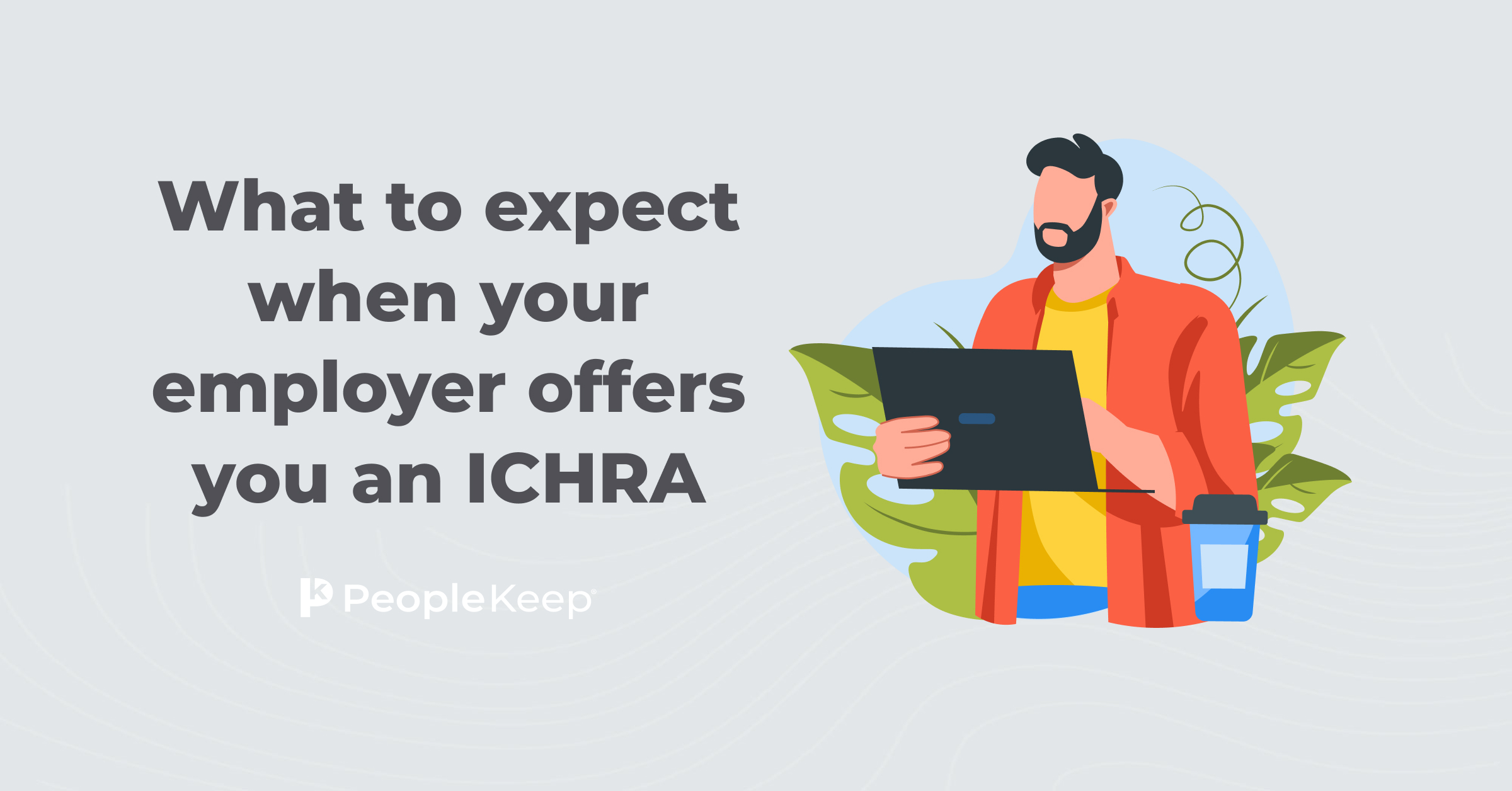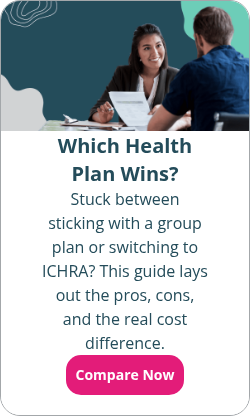How to get out of your employer's group health plan mid-year
By Elizabeth Walker on November 4, 2024 at 8:00 AM
About 154 million Americans have an employer-sponsored group health plan1. While group health insurance is popular, you may choose not to enroll for many reasons. For example, the premiums may be too high, your preferred doctors might be out-of-network, or your spouse’s health plan may already cover you.
If you have group health coverage, the IRS allows you to drop the policy under specific circumstances. But when can you cancel your current health insurance plan? And what are your options for enrolling in a new policy?
In this blog post, you’ll learn:
- When you can cancel your current health plan, and which qualifying life events allow for mid-year changes.
- How using pre-tax deductions for health insurance premiums affects your ability to change plans.
- Your options for obtaining new health coverage after dropping your group plan.
Can you cancel your health insurance policy at any time?
You can cancel your group coverage anytime if you don’t pay your health insurance premiums through payroll deductions on a pre-tax basis. But if your premium payments use pre-tax dollars, the IRS considers your group policy a Section 125 plan or cafeteria plan.
Employees can only change or cancel a company-sponsored cafeteria plan in specific situations.
You can only modify your group coverage if you have one of the following “change in election” life events2:
- Changes in marital status, dependents (or dependent eligibility), employment, or ZIP code.
- Major changes by your health insurance provider to your current plan’s cost or covered medical services.
- Changes made to your employee benefits package (e.g., the addition of a health reimbursement arrangement (HRA)
- Change to a spouse’s or dependent’s coverage under another employer plan
- Loss of other health coverage (e.g., a government-sponsored health plan).
- Health Insurance Portability and Accountability Act (HIPAA) special enrollment rights.
- Judgments, decrees, or orders (i.e., resulting from a divorce, separation, or annulment).
- Eligibility for Medicare or Medicaid
Besides the HIPAA special enrollment rights, your employer can determine what mid-year changes you can make and how much notice is necessary to make them. Your summary plan description (SPD) will outline these benefit details in advance.
In 2014, the IRS expanded the process for canceling group healthcare coverage if you have a cafeteria plan. The following two situations only apply if your plan isn’t a health flexible spending account (FSA) and provides minimum essential coverage (MEC).
The IRS allows employees to cancel their group coverage and enroll in marketplace coverage if3:
- An employer reduces an employee’s hours to fewer than an average of 30 hours per week.
- The new policy must provide MEC. It must also be effective no later than the first day of the second month following the last day of the group coverage.
- An employee is eligible for a special enrollment period or the annual Open Enrollment Period. They must also intend to enroll in a qualified health plan through a public exchange.
- The new marketplace plan must be effective by the day immediately following the last day of the group coverage.
If you have a qualifying life event, you'll have a 60-day special enrollment window to enroll in a new health plan. If you miss this time period, you’ll have to wait until Open Enrollment, which could result in gaps in coverage.
Is there a grace period for health insurance cancellation?
The above are instances where you can cancel or change your group health plan mid-year. But what about if an insurer cancels your policy?
Your health insurance company will often cancel coverage if you don’t pay your monthly premium. They may also cancel if you provide fraudulent information on your insurance application.
Either way, your insurance provider must give you at least 30 days' notice before canceling your policy. Depending on the state, the waiting period could be 45 days, 60 days, or 120 days notice.
You won’t qualify for a special enrollment period if your insurer cancels your plan due to non-payment4. So it’s important to pay all your premiums on time to avoid a loss of coverage.
Is there a penalty for canceling a health insurance policy?
The individual mandate under the Affordable Care Act (ACA) once required Americans to enroll in a health plan with MEC or pay a federal tax penalty. Acceptable plans could be group health plans or qualifying individual policies.
In 2017, Congress removed the federal penalties for not having health coverage. But, some states still have an individual mandate.
The following locations require their residents to have medical insurance or pay a penalty:
- New Jersey
- California
- Rhode Island
- Massachusetts
- District of Columbia
Vermont also requires its residents to have current insurance coverage. But the state doesn’t penalize individuals for not doing so.
What are your health insurance coverage options once you drop your group plan?
If you aren’t enrolling in Medicare, joining a spouse’s health policy, or participating in a new employer’s group coverage, you can buy your own individual plan.
Individual coverage—both self-only and family plans—is available on public and private health exchanges.
|
Features of public health exchanges |
Features of private health exchanges |
|
Public exchanges include the federal Health Insurance Marketplace or a state-based exchange. |
Private exchanges allow you to buy medical policies from a health insurance company or a broker. |
|
All health plans on public exchanges must have an actuarial value of at least 60%. This is known as a bronze-level plan of the metal tiers of health coverage. |
In addition to ACA-compliant health plans, private exchanges offer a variety of vision policies, dental coverage, and other supplemental benefit plans. |
|
They must also cover the ten essential health benefits, which include prescription drugs, mental health care, preventive services, and more. |
Individual coverage on private exchanges might have household income eligibility thresholds. |
|
You can compare, shop, and enroll in a marketplace plan all on one site. |
Brokers offer a personalized shopping experience if you have a unique financial situation or questions. |
|
You can see if you qualify for cost savings subsidies, like premium tax credits, to lower the cost of premiums. |
You can only receive subsidies for medical care and premiums if you shop on a public health exchange. |
Whichever exchange you choose, contact your human resources department before you drop your healthcare coverage to let them know about the change. You should also confirm with your health insurance company that the cancellation date of your current coverage is on or after the date your new policy begins.
Conclusion
Participating in a group health plan isn’t the best option for everyone. Luckily, you have a few viable options if you want to leave your current insurance plan.
The easiest way is to wait for Open Enrollment Period. But you can also enroll in an individual plan mid-year with a special enrollment period if you have a qualifying life event. This way, you’ll prevent gaps in coverage and be able to choose the health insurance plan that works best for you and your family.
This article was originally published on January 27, 2015. It was last updated on November 4, 2024.
Check out more resources
See these related articles

How to switch to your spouse's health insurance policy
Want to switch to your spouse’s health insurance? Learn when you can add a spouse to a policy, qualifying events, and steps to avoid coverage gaps.

What to expect when your employer offers you an ICHRA
Curious about ICHRAs? Discover what to expect when your employer offers you an individual coverage health reimbursement arrangement with this guide.

A state-by-state guide to extended open enrollment periods
Did your state extend the annual open enrollment period? Find out in this comprehensive guide detailing the extended open enrollment periods across all states.



